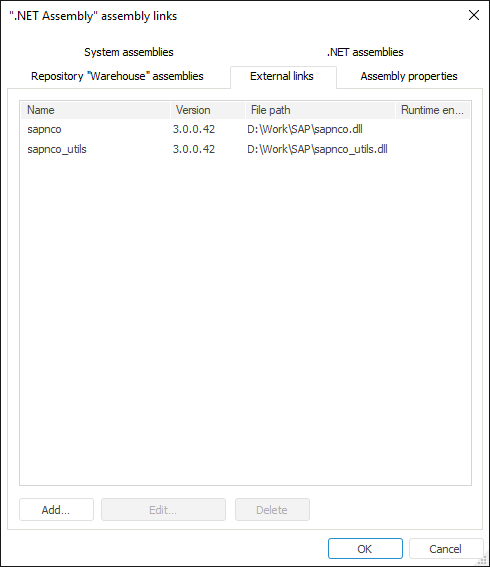Create a new .NET assembly in Foresight Analytics Platform repository.
Add a link to SAP sapnco.dll and sapnco_utils.dll libraries:

In the code of created .NET unit add strings to import library contents:
The general principle of interaction between Foresight Analytics Platform and various SAP products is given in the Connecting to SAP subsection. This article describes setup of interaction using remote function call (RFC). RFC is a standard interface of communication and data exchange between various SAP products. To connect, to call RFC functions, and process obtained data, develop a user application in the Fore.NET language.
To connect to SAP RFC, use SAP.Net Connector 3.0. It is important to have sapnco.dll and sapnco_utils.dll libraries. To get library data, go to SAP Market Place, you should have identifier and password for download. If there is no identifier and password, contact SAP Basis support to get specified libraries. Bitness of installed Foresight Analytics Platform version and obtained libraries must match.
If everything for the SAP.Net Connector 3.0 is ready, execute one of the following operations:
Create a new .NET assembly in Foresight Analytics Platform repository.
Add a link to SAP sapnco.dll and sapnco_utils.dll libraries:

In the code of created .NET unit add strings to import library contents:
Imports SAP.Middleware.Connector;
Add a code for SAP connection and calling various RFC functions specified below.
When the Main procedure is started, two operations are executed:
The Connection procedure, which connects to SAP server, is called.
The executeSAPFunction function, which executes RFC function and returns the result, is called. The list of parameters generated by SAPParams variable and the RFC function name and returned table name specified in the executeSAPFunction procedure must correspond to the signature of called RFC function.
The result of function execution will be available in the DataTable variable and can be further used to get and process data using various Foresight Analytics Platform tools.
Imports System;
Imports Prognoz.Platform.Interop.Metabase;
Imports SAP.Middleware.Connector;
Public Class StartParams
Private m_Metabase: Prognoz.Platform.Interop.Metabase.IMetabase;
Public Property Metabase: Prognoz.Platform.Interop.Metabase.IMetabase
Get
Begin
Return m_Metabase
End Get
Set
Begin
m_Metabase := Value;
End Set
End Property Metabase;
End Class;
Public Class Program
Public Shared ConfigInitialized: boolean;
Public Shared rfcDestination: RfcDestination;
[STAThread]
Public Shared Sub Main(Params: StartParams);
Var
SAPParams: array[2] Of SAPParam;
DataTable: IRfcTable;
config: IDestinationConfiguration;
Begin
Connection();
SAPParams[0] := New SAPParam("Country", "Russia");
SAPParams[1] := New SAPParam("Retail", "Food");
DataTable := executeSAPFunction("GetData", "Table", SAPParams);
//...
//Further use of DataTable to communicate with Foresight analytics Platform objects
//...
End Sub;
Private Shared Sub Connection();
Var
config: IDestinationConfiguration;
Begin
If Not ConfigInitialized Then
config := New SAPDestinationConfig();
config.GetParameters("TEST");
RfcDestinationManager.RegisterDestinationConfiguration(config);
ConfigInitialized := True;
End If;
rfcDestination := RfcDestinationManager.GetDestination("TEST");
rfcDestination.Ping();
End Sub;
Private Shared Function executeSAPFunction(functionName: string; resultTableName: string; Paramarray params: array Of SAPParam): IRfcTable;
Var
func: IRfcFunction;
Begin
func := getSapFunction(functionName, params);
Try
func.Invoke(rfcDestination);
Return func.GetTable(resultTableName);
Except On e: RfcBaseException Do
System.Diagnostics.Debug.WriteLine(e.Message);
Finally
End Try;
End Function;
Private Shared Function getSapFunction(functionName: string; Paramarray params: array Of SAPParam): IRfcFunction;
Var
func: IRfcFunction;
param: SAPParam;
Begin
func := rfcDestination.Repository.CreateFunction(functionName);
For Each param In params Do
func.SetValue(param.name, param.value);
End For;
Return func;
End Function;
End Class;
Public Class SAPParam
Public name: string;
Public value: object;
Public Constructor SAPParam(_name: string; _value: object);
Begin
name := _name;
value := _value;
End Constructor;
End Class;
Class SAPDestinationConfig: IDestinationConfiguration
Public Function ChangeEventsSupported(): boolean;
Begin
Return False;
End Function;
Public Event ConfigurationChanged: RFCDestinationManager.ConfigurationChangeHandler;
Public Function GetParameters(destinationName: string): RfcConfigParameters;
Var
params: RfcConfigParameters;
Begin
params := New RfcConfigParameters();
params.Add(RfcConfigParameters.Name, "TEST");
params.Add(RfcConfigParameters.AppServerHost, "ServerName");
params.Add(RfcConfigParameters.SystemNumber, "0");
params.Add(RfcConfigParameters.SystemID, "100");
params.Add(RfcConfigParameters.User, "username");
params.Add(RfcConfigParameters.Password, "password");
params.Add(RfcConfigParameters.Client, "100");
params.Add(RfcConfigParameters.Language, "EN");
params.Add(RfcConfigParameters.PoolSize, "10");
Return params;
End Function;
End Class;
See also: